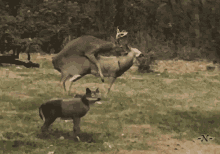NPR Cookie Consent and Choices
Scientists have evidence that SARS-CoV-2 spreads explosively in white-tailed deer, and the virus is widespread in this deer population across the U.S.
Researchers say the findings are quite concerning and could have vast implications for the long-term course of the global pandemic.
Since SARS-CoV-2 first emerged, there have been several signs that white-tailed deer would be highly susceptible to the virus — and that many of these animals were catching it across the country.
In September last year, computer models suggested SARS-CoV-2 could easily bind to and enter the deer's cells. A recent survey of white-tailed deer in the Northeast and Midwest foundthat 40% of them had antibodies against SARS-CoV-2.
Now veterinarians at The Pennsylvania State University have found active SARS-CoV-2 infections in at least 30% of deer tested across Iowa during 2020. The study, published online last week, suggests that white-tailed deer could become what's known as a reservoir for SARS-CoV-2. That is, the animals could carry the virus indefinitely and spread it back to humans periodically.
If that's the case, it would essentially dash any hopes of eliminating or eradicating the virus in the U.S. — and therefore in the world — says veterinary virologist Suresh Kuchipudi at Penn State, who co-led the study.
"If the virus has opportunities to find an alternate host besides humans, which we would call a reservoir, that will create a safe haven where the virus can continue to circulate even if the entire human population becomes immune," he says. "And so it becomes more and more complicated to manage or even eradicate the virus."
In the study, Kuchipudi and his colleagues looked for the presence of SARS-CoV-2 virus in the lymph nodes of nearly 300 white-tailed deer, including more than 100 wild deer. "So these deer were either roadkill or free-living deer that hunters had killed [to eat]," says veterinary microbiologist Vivek Kapur at Penn State, who also co-led the study.
What they found left Kapur and Kuchipudi dumbfounded. "It was actually quite stunning to us," Kapur says. "We were very surprised to see such a high number of positive samples."
During April to December of last year, about 30% of the deer that they tested were positive for SARS-CoV-2 by a PCR test. And then during the winter surge in Iowa, from Nov. 23, 2020 to Jan. 10, about 80% of the deer that they tested were infected. At the peak of the surge, Kapur says, the prevalence of the virus in deer was effectively about 50 to 100 times the prevalence in Iowa residents at the time.





